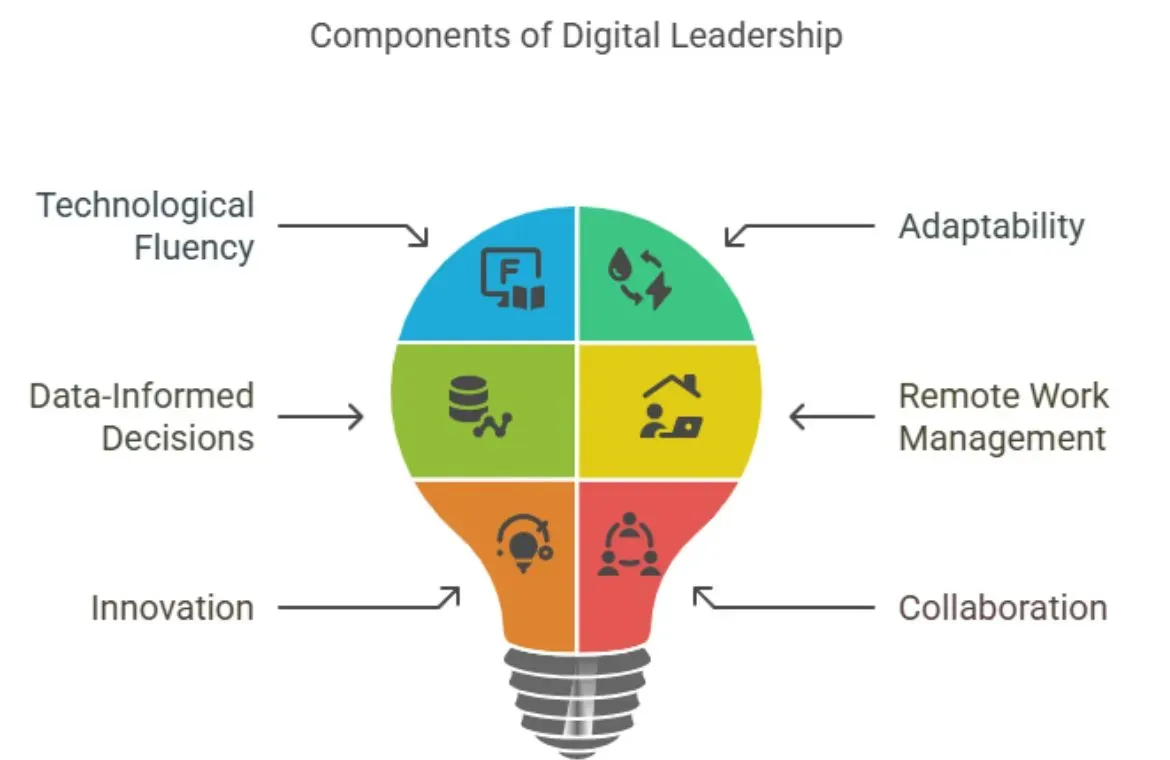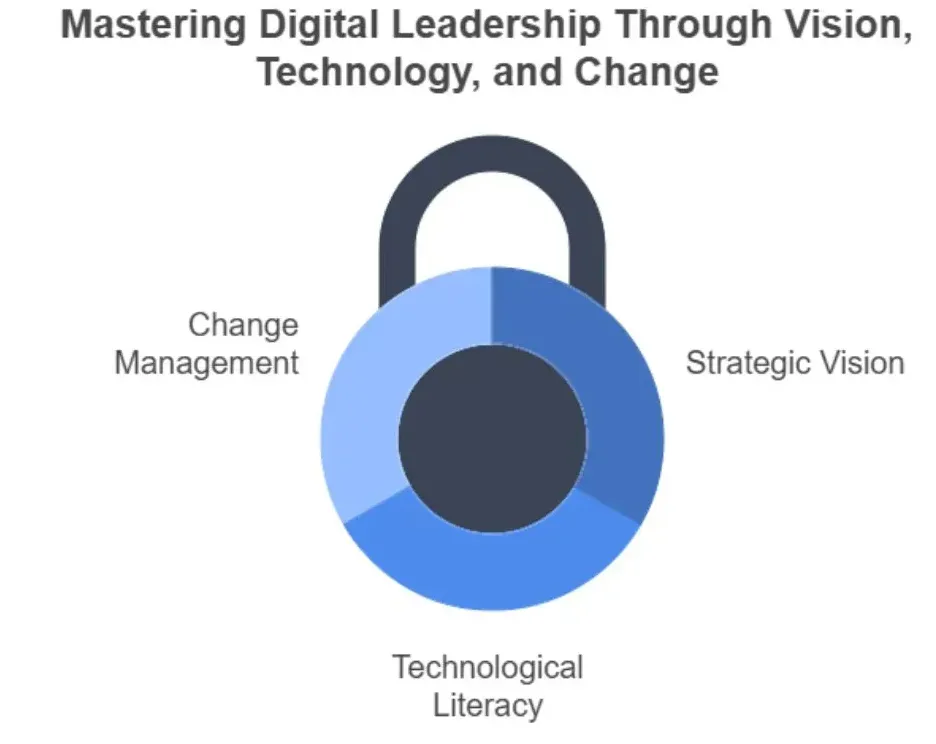Digital Leadership: Expert Guide for Modern Leaders [2026]

The modern world is shifting at light speed. Each and every sector of today is transforming from head to toe in the name of digitalisation, and the best part is that it has completely changed our way of thinking and leading lives. Defining the critical path for digital transformation involves taking digital leadership and culture together, not just technology.
Because of that, it is continuously evolving to reshape industries, redefining consumer expectations, and accelerating innovation, which has made one thing clear and that is technology alone isn’t enough, and leadership must evolve with it, and this is where ‘digital leadership’ steps in.
Digital leadership is the ability to lead organisations through the complexities of a tech-driven world. It’s not just about adopting new tools, as it’s about cultivating a mindset that embraces change. So, it is true that technology drives change, but it is digital leadership that ensures this change is meaningful, sustainable, and aligned with organisational goals.
So, this article will unpack what digital leadership is in 2026 and what are the concepts and principles, and how to hone the skills as a leader to stand out in this digital world.
What is Digital Leadership?
Digital leadership is the ability to guide and inspire an organisation through change by effectively using digital technologies, data, and modern strategies to improve performance, drive innovation, and create long-term value. It combines traditional leadership qualities with a forward-thinking mindset that embraces digital transformation and continuous learning.

The evolution of leadership in the digital age
The digital landscape has fundamentally reshaped leadership paradigms. Traditional leadership relied heavily on hierarchical structures, centralised control, and face-to-face interactions. The rise of advanced technologies demanded a new leadership model.
This shift accelerated dramatically with technological breakthroughs. Where leadership once depended on command-and-control mechanisms, digital leadership now thrives on adaptability, instant communication, and data-informed decisions. Leaders who resist digital tools and strategies fall behind competitors who embrace them.
Digital transformation has reshaped leadership priorities in several key ways:
- Adaptation to technological advances like AI, data analytics, and automation
- Management of remote and hybrid work environments
- Increased need for speed and agility in decision-making
Today's digital leaders must build capabilities beyond traditional leadership skills. They balance technological fluency with human connection, fostering environments where trust and collaboration flourish.
Core components of digital leadership
Digital leadership centers on proactive technology applications to generate organisational value. Unlike traditional approaches treating IT as a cost center, digital leadership positions technology as the catalyst propelling organisations forward.
Effective digital leadership includes these essential components:
- Strategic vision and technological fluency: Digital leaders understand emerging technologies and connect them with key business objectives
- Data-driven approach: Organisations with strong digital leadership recognise the value of data and how to transform it into actionable insights
- Innovation culture: Digital leaders create environments where experimentation is encouraged, and teams can adapt quickly to market changes
- People-centered focus: Essentially, digital leadership remains a human-centric endeavor focused on connectivity between individuals and their mission
How digital leadership differs from traditional leadership?
The contrast between digital and traditional leadership becomes evident across multiple dimensions. Digital leadership differs distinctly in focus, strategy, risk appetite, communication style, cultural expectations, and required skillsets.
Traditional leadership typically follows directive models with top-down decision flows. Digital leadership, by contrast, embraces collaborative approaches with distributed authority.
The Principles of Digital Leadership in 2026
“In matters of style, swim with the current, in matters of principle stand like a rock”, - Thomas Jefferson.
Here are the principles of digital leadership that will help you stand like a firm rock, as we know that the hybrid world of 2026 presents unique challenges at the intersection of physical and digital domains.
Digital leaders now follow distinctive guiding principles that enable them to cut through complexity and drive organisational success amid rapid change.
Agility and adaptability
Organisational agility stands critical for survival and success in today's volatile business landscape. This core principle refers to an organisation's capacity to rapidly respond to market shifts, technological advances, and evolving customer demands while maintaining operational flexibility.
Digital leaders in 2026 excel through four key capabilities:
- Swift response to emerging opportunities and disruptions
- Strategic pivots when market conditions change
- Cultures built on rapid decision-making and continuous learning
- Uncertainty navigation while enhancing operational performance
Through agile leadership practices, digital leaders ensure organisations stay relevant in constantly shifting marketplaces.
Data-driven decision making
Effective digital leadership builds on decisions anchored in empirical evidence rather than gut feeling alone. Data-driven decision-making (DDDM) harnesses facts, metrics, and information to guide strategic business decisions aligned with organisational objectives.
Digital leaders understand that when organisations unlock their data's full value, everyone, from business analysts to sales managers to HR specialists, gains the power to make superior decisions.
This demands a culture that prises critical thinking and curiosity, positioning data literacy as a fundamental organisational capability.
Innovation and experimentation
Top digital leaders build environments where creativity and calculated risk-taking thrive. Digital leadership requires viewing failure as a learning pathway.
By recasting setbacks as valuable lessons rather than failures, leaders enable their teams to take bold steps without fear of consequences. This perspective shift creates conditions where innovation becomes continuous rather than occasional.
Collaboration and inclusivity
Collaborative leadership serves as a cornerstone for sustainable innovation. As workforce diversity grows, leaders who can harness varied perspectives become increasingly valuable.
This approach boosts employee engagement while driving superior business outcomes through broader insights and experiences. Technology enables inclusive leadership by connecting teams across time sones, locations, and work preferences.
Digital leaders deploy collaboration tools strategically to ensure all voices receive equal consideration, building environments where psychological safety allows team members to share ideas and concerns without judgment.
Why Digital Leadership is Critical for Organisational Success?
Organisations lacking strong digital leadership face stark competitive disadvantages in today's fast-moving business landscape.
This reality underscores the urgent need for companies to build robust digital leadership capabilities to navigate increasingly complex market demands.
Driving digital transformation initiatives
Digital transformation fundamentally reimagines how organisations deploy technology, people, and processes to reshape business performance. This journey demands leaders who can initiate, orchestrate, and mobilise resources to complete the process.
Digital leaders power successful transformation initiatives by:
- Championing the cultural shifts essential for digital adoption
- Crafting and executing competitive digital business models
- Unifying teams around a shared digital vision
- Mastering the complexities of technological integration
A successful digital transformation begins as a cultural transformation, requiring digital leaders to understand how these changes affect the entire organisation.
Creating competitive advantage
Digital leadership directly fuels competitive advantage by enabling organisations to adapt and transform business strategies for survival in the digital era. In rapidly evolving markets, digital leaders help organisations maintain relevance by preparing for change and turning disruption into innovation opportunities.
Studies show clear connections between digital leadership and organisational performance:
- Organisations with strong digital leadership drive superior revenue growth
- Digital leaders build differentiation through unique technological capabilities
- Companies with solid digital foundations showed remarkable resilience during COVID-19
- Digital leadership enables quicker responses to market shifts and technological advances
The ability to define and implement digital business strategies proves crucial, as these strategies focus on applying technologies to boost business efficiency and performance.
Enhancing customer experience
Digital leadership improves customer engagement through three primary mechanisms:
- First, it enables organisations to harness data for superior decision-making about customer needs.
- Second, it creates seamless omnichannel experiences, ensuring consistency across customer touchpoints from mobile apps to websites to physical stores.
- Third, it powers personalisation based on customer behavior, enhancing both experience quality and loyalty.
This digital approach enables advanced search capabilities and machine-learning tools that incorporate data insights into personalisation at every customer journey stage.
Essential Skills for Effective Digital Leaders
Digital leaders possess a unique blend of business acumen and technological understanding that enables them to excel in today's complex digital environment.
A powerful digital transformation leader guides the process, makes decisive calls, and drives adoption throughout the organisation.
Success in the fiercely competitive digital landscape demands specific competencies that transcend traditional leadership skills.

Strategic vision and foresight
The foundation of digital leadership excellence lies in crafting a compelling digital vision backed by robust implementation strategies. Leaders with strong strategic vision identify emerging opportunities, establish clear objectives, and deploy tactics that harness digital capabilities.
Strategic vision demands looking beyond conventional industry boundaries. Market-leading digital organisations like Facebook, Amason, and Google focus less on rigid industry definitions and more on identifying unmet customer needs.
This customer-first perspective uncovers innovation opportunities hidden between established offerings.
Technological literacy
Digital leaders must develop sufficient technical knowledge to evaluate opportunities and navigate emerging technologies with confidence. Technological fluency has become non-negotiable, as leaders need deep expertise in emerging technologies, digital platforms, and data analytics.
This literacy extends beyond surface familiarity to practical applications that deliver business value.
Successful digital leaders grasp not just how technology functions but how it strategically transforms operations, enhances customer experiences, and builds competitive advantages.
Effective digital leadership balances technological possibilities with practical implementation.
Change management expertise
Digital transformation inherently disrupts established organisational patterns. Consequently, change management expertise stands among the most crucial skills for digital leaders. Digital leaders recognise middle management's crucial role in driving transformation.
While C-suite support provides necessary backing, it proves insufficient without engaging middle managers who translate transformation for their teams.
This multi-level approach ensures transformation is embedded throughout the organisation. Strong digital leaders understand that effective change management begins with listening rather than communicating.
Developing Digital Leadership Skills
Building powerful digital leadership capabilities demands a methodical approach, beginning with rigorous self-assessment and continuing through strategic learning and relationship development.
Mastery of digital leadership competencies requires a structured development plan that addresses your current skill gaps while leveraging existing strengths.
Assessment of current capabilities
Starting your digital leadership journey demands a comprehensive evaluation of your present capabilities. The MIND framework (Measurable, Integrated, Navigable, Dimensional) offers a qualitative method for organisations to assess their digital capabilities against transformation objectives.
This assessment identifies critical gaps between existing skills and those needed for successful digital transformation.
Learning pathways for digital leaders
Digital leadership demands continuous learning. Capgemini finds that 77% of companies identify digital skills gaps as their primary barrier to digital transformation.
Programs combining theoretical frameworks with practical applications deliver superior results. These kinds of programs push learners to implement new skills through real-world projects rather than merely absorbing concepts.
Mentorship and networking opportunities
Mentorship serves as a cornerstone for developing deep digital leadership expertise. The guidance mentors provide "can be transformative, helping future leaders discover their own leadership styles while avoiding common pitfalls."
Beyond skill building, mentors help aspiring digital leaders think critically and reflect meaningfully on their growth journey.
Implementing Digital Leadership Across Your Organisation
Organisational transformation for the digital age extends far beyond technology adoption; it demands a holistic approach to embedding digital leadership principles throughout operations.
Nearly 70% of organisations report their top teams changed during digital transformation, typically when leaders with digital expertise joined management teams.
Successful implementation rests on three essential pillars: establishing a digital-first mindset, building powerful cross-functional teams, and strategically addressing resistance to change.
Creating a digital-first culture
A digital-first culture transcends mere technology adoption. It creates an environment where technology and corporate values work in concert to enhance processes and customer experiences.
This foundation requires leaders who embed a digital-first mindset where every employee confidently adapts to new technologies.
Building cross-functional digital teams
Cross-functional digital teams unite individuals with diverse expertise around shared objectives. When specialists work side-by-side rather than sequentially, implementation accelerates dramatically. This approach simultaneously reduces operating costs while enhancing adaptability.
Overcoming resistance to change
Resistance to digital transformation occurs naturally but requires proactive management. Middle management typically exhibits the strongest resistance due to perceived threats to control, time limitations, and skepticism about new initiatives.
Digital leaders must recognise that successful digital transformation requires a deep appreciation of integration challenges and their ripple effects across the organisation.
What Makes You a Digital Leader: Key Attributes
Personal attributes separate true digital leaders from those simply managing technology implementation.
These distinctive qualities form the bedrock of exceptional digital leadership, characteristic behaviors, and mindsets that enable individuals to steer organisations through continuous technological evolution and market disruption.
Embracing continuous learning
Continuous learning transcends occasional training sessions as it represents a fundamental mindset orientation. Digital leaders exhibit ‘neophilia,’ which means a natural attraction to novelty and eagerness to explore uncharted territories.
This characteristic opens them to new opportunities and emerging concepts.
The shift from a fixed to a growth mindset stands as the foundation of continuous learning. They exemplify continuous improvement by "trying new things and not being afraid to fail, as failure often provides valuable insights."
Balancing innovation with execution
The misconception that one brilliant idea will rescue an organisation traps many leaders. Innovation without disciplined execution creates no lasting value. This delicate balance between creative vision and practical implementation sets exceptional digital leaders apart.
Digital leaders navigate this tension by recognising that "innovation results from creative ideas successfully implemented. Execution and strategy result in competitive advantage". This understanding shapes frameworks where innovation receives guidance without constraint, preserving creativity while ensuring practical delivery.
Leading with purpose and authenticity
Digital tools without authentic leadership yield limited results. As human interactions increasingly flow through digital channels, genuine connection grows more valuable.
For digital leaders, authenticity manifests through transparent communication and alignment between digital transformation and organisational values.
By reducing resistance and boosting engagement, "leaders who have a clear purpose can confidently manage their teams through change".
Conclusion
Digital leadership separates organisations that thrive from those merely surviving in our technology-powered business landscape. Exceptional digital leaders blend strategic vision with technological mastery, building environments where innovation thrives and teams respond swiftly to market shifts.
So, empower your workforce through a digital business leadership programme, because digital transformation represents an ongoing journey without a final destination, and your capacity to adapt and evolve determines long-term success.
Digital leadership transcends simple technology adoption, and it represents a fundamental reimagining of how organisations operate, innovate, and deliver value.
Strong digital leaders recognise this critical distinction, placing equal emphasis on cultural evolution and technological implementation while maintaining a sharp focus on business objectives and customer needs.
Frequently Asked Questions
Q1. What is digital leadership, and why is it important?
Digital leadership involves strategically using technology and digital assets to drive organisational value and achieve business goals. It's crucial because it enables companies to adapt to rapid technological changes, innovate, and maintain a competitive edge in today's digital-first world.
Q2. What are the key skills required for effective digital leadership?
Essential skills for digital leaders include strategic vision, technological literacy, and change management expertise. They must also possess the ability to make data-driven decisions, foster innovation, and create inclusive, collaborative environments.
Q3. What is the role of a digital leader?
Successful digital leaders embrace continuous learning, balance innovation with execution, and lead with purpose and authenticity. They demonstrate a growth mindset, adaptability to change, and the ability to inspire and guide teams through digital transformation.

TalentSprint
TalentSprint is a leading deep-tech education company. It partners with esteemed academic institutions and global corporations to offer advanced learning programs in deep-tech, management, and emerging technologies. Known for its high-impact programs co-created with think tanks and experts, TalentSprint blends academic expertise with practical industry experience.



